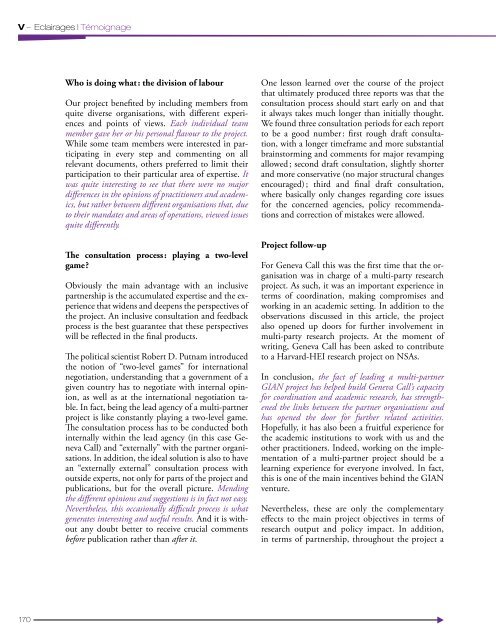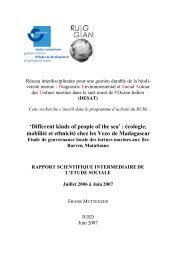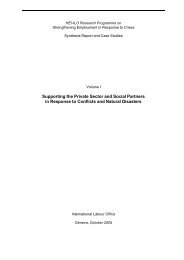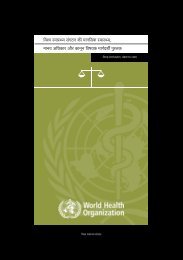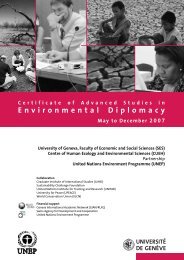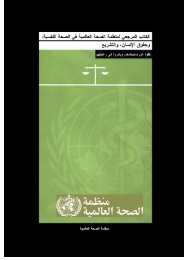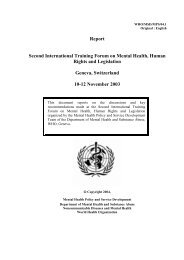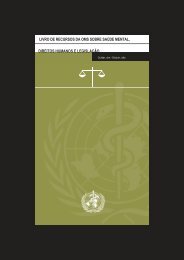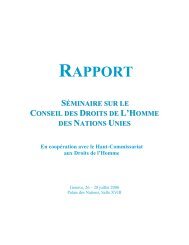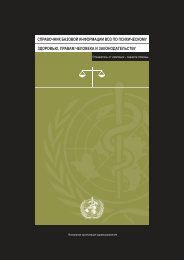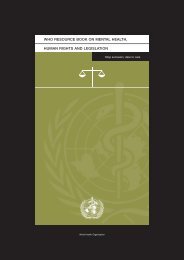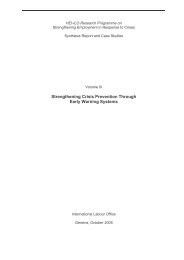Les liaisons fructueuses - RUIG-GIAN
Les liaisons fructueuses - RUIG-GIAN
Les liaisons fructueuses - RUIG-GIAN
You also want an ePaper? Increase the reach of your titles
YUMPU automatically turns print PDFs into web optimized ePapers that Google loves.
V – Eclairages | Témoignage<br />
Who is doing what : the division of labour<br />
Our project benefited by including members from<br />
quite diverse organisations, with different experiences<br />
and points of views. Each individual team<br />
member gave her or his personal flavour to the project.<br />
While some team members were interested in participating<br />
in every step and commenting on all<br />
relevant documents, others preferred to limit their<br />
participation to their particular area of expertise. It<br />
was quite interesting to see that there were no major<br />
differences in the opinions of practitioners and academics,<br />
but rather between different organisations that, due<br />
to their mandates and areas of operations, viewed issues<br />
quite differently.<br />
The consultation process : playing a two-level<br />
game ?<br />
Obviously the main advantage with an inclusive<br />
partnership is the accumulated expertise and the experience<br />
that widens and deepens the perspectives of<br />
the project. An inclusive consultation and feedback<br />
process is the best guarantee that these perspectives<br />
will be reflected in the final products.<br />
The political scientist Robert D. Putnam introduced<br />
the notion of “two-level games” for international<br />
negotiation, understanding that a government of a<br />
given country has to negotiate with internal opinion,<br />
as well as at the international negotiation table.<br />
In fact, being the lead agency of a multi-partner<br />
project is like constantly playing a two-level game.<br />
The consultation process has to be conducted both<br />
internally within the lead agency (in this case Geneva<br />
Call) and “externally” with the partner organisations.<br />
In addition, the ideal solution is also to have<br />
an “externally external” consultation process with<br />
outside experts, not only for parts of the project and<br />
publications, but for the overall picture. Mending<br />
the different opinions and suggestions is in fact not easy.<br />
Nevertheless, this occasionally difficult process is what<br />
generates interesting and useful results. And it is without<br />
any doubt better to receive crucial comments<br />
before publication rather than after it.<br />
One lesson learned over the course of the project<br />
that ultimately produced three reports was that the<br />
consultation process should start early on and that<br />
it always takes much longer than initially thought.<br />
We found three consultation periods for each report<br />
to be a good number : first rough draft consultation,<br />
with a longer timeframe and more substantial<br />
brainstorming and comments for major revamping<br />
allowed ; second draft consultation, slightly shorter<br />
and more conservative (no major structural changes<br />
encouraged) ; third and final draft consultation,<br />
where basically only changes regarding core issues<br />
for the concerned agencies, policy recommendations<br />
and correction of mistakes were allowed.<br />
Project follow-up<br />
For Geneva Call this was the first time that the organisation<br />
was in charge of a multi-party research<br />
project. As such, it was an important experience in<br />
terms of coordination, making compromises and<br />
working in an academic setting. In addition to the<br />
observations discussed in this article, the project<br />
also opened up doors for further involvement in<br />
multi-party research projects. At the moment of<br />
writing, Geneva Call has been asked to contribute<br />
to a Harvard-HEI research project on NSAs.<br />
In conclusion, the fact of leading a multi-partner<br />
<strong>GIAN</strong> project has helped build Geneva Call’s capacity<br />
for coordination and academic research, has strengthened<br />
the links between the partner organisations and<br />
has opened the door for further related activities.<br />
Hopefully, it has also been a fruitful experience for<br />
the academic institutions to work with us and the<br />
other practitioners. Indeed, working on the implementation<br />
of a multi-partner project should be a<br />
learning experience for everyone involved. In fact,<br />
this is one of the main incentives behind the <strong>GIAN</strong><br />
venture.<br />
Nevertheless, these are only the complementary<br />
effects to the main project objectives in terms of<br />
research output and policy impact. In addition,<br />
in terms of partnership, throughout the project a<br />
170


